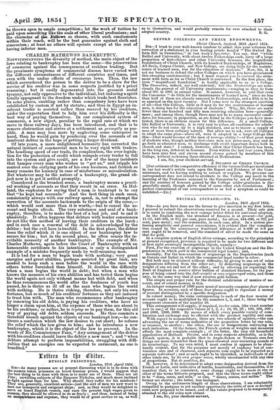CHARLES MATHEWS'S BANKRUPTCY.
NOTWITHSTANDING the diversity of method, the main object of the laws relating to bankruptcy has been the same—the preservation of commerce against the consequences of reckless trading. But the proximate symptoms of commercial disease have varied with the different circumstances of different countries and times, and even with the undue effects of erroneous laws. Thus, the law which surrendered the person to the debtor to be a slave for the service of his creditor was in some respects justified by a priori reasoning; but it easily degenerated into the grossest social tyranny, not only oppressive to the individual, but inducing a spirit totally oppugnant to the freedom under which trade best flourishes. In some places, enabling rather than compulsory laws have been established by custom if not by statute; and thus in Egypt an in- solvent trader is assisted rather than coerced by his creditors, under the expectation that to help him over his difficulty is the best way of paying themselves. In our complicated system of commerce, a new object, peculiar to the rapid rate at which we move in these railway days, has been introduced, and that is to remove obstruction and arrive at a settlement as promptly as pos- sible. A man may lose more by neglecting some enterprise in hand, than he would gain by pondering over the accounts of an insolvent debtor in the hope of getting a larger dividend.
Of late years, a more enlightened humanity has corrected the natural instinct of commercial men to be very rigid with traders. The headlong speed of our trade, its complication, the over-legisla- tion for the protection of credit which compels every trader to fall into the system and give credit, are a few of the many incidents that hamper every man who wishes to "get on," and cripple his control over the outlying parts of his own business, and furnish so many reasons for leniency in case of misfortune or miscalculation. But whatever may be the nature of a bankruptcy, the grand ob- ject now is to get it settled promptly. Considered in the broadest sense, a bankruptcy means a practi- cal working of accounts so that they result in an error. In Hol- land, the euphuism for saying that a mak, is bankrupt is to say that "he kept bad accounts." And the best thing in such cases, consistently always with our railway speed, is, not to attempt the correction of the accounts backwards to the origin of the error,— which would cost more than it is worth,—but to cancel the ac- count and begin afresh. The very substance and soul of a bank- ruptcy, therefore, is to make the best of a bad job, and to end it absolutely. It often happens that debtors with tender consciences do not like this method of leaving their creditors in the lurch ; and in such case a renewal of the debt is acknowledged by the debtor : but the evil here is twofold. In the first place, the debtor loses the relief which it is one objeot of our bankruptcy law to secure for him ; but in the second. place, he often causes the in- evitable necessity of another bankruptcy. The example of Mr. Charles Mathews, again before the Court of Bankruptcy with an honourable certificate to his intentions, is only a distinguished example of a mistake frequently made by well-meaning men.
It is bad for a man to begin trade with nothing; very great energies and great abilities, perhaps-assisted by great luck, are needed to keep such a man before the world in the race with others better furnished than himself. It doubles the difficulty when a man begins the world in debt; but when a man who knows the measure of his own abilities and has tested them begins the world again not only without means but with debt, and when he thus recommences the world after the freshness of youth has passed, he is thrice as ill off as the man who begins the world with nothing. He is thrice risking, therefore, not only his own fortunes, but so much of his creditors' fortunes as they are induced to trust him with. The man who recommences after bankruptcy by renewing his old debts, is paying his creditors, who have no longer a claim upon him, at the expense of those who are about to be his creditors; or rather, he is trying so to pay them, for this old way of paying old debts seldom succeeds. He thus commits a threefold breach against the objects of our bankrupt law,—he con- tinues a confusion which the law desires to cut short; he refuses the relief which the law gives to him • and be introduces a new bankruptcy, which it is the object of the law to prevent. In the words of Mr. Commissioner Fane, " Any arrangement of the debtor With his creditors should leave the debtor a new man"; and "when debtors attempt to perform impossibilities, struggling with diffi- culties that no energies can be expected to surmount, no one is benefited."


























 Previous page
Previous page